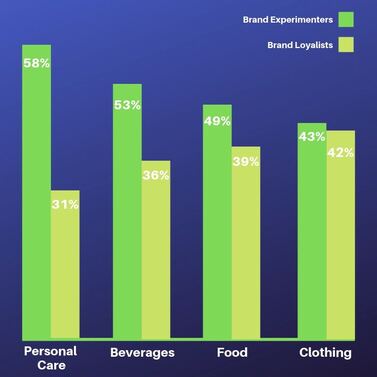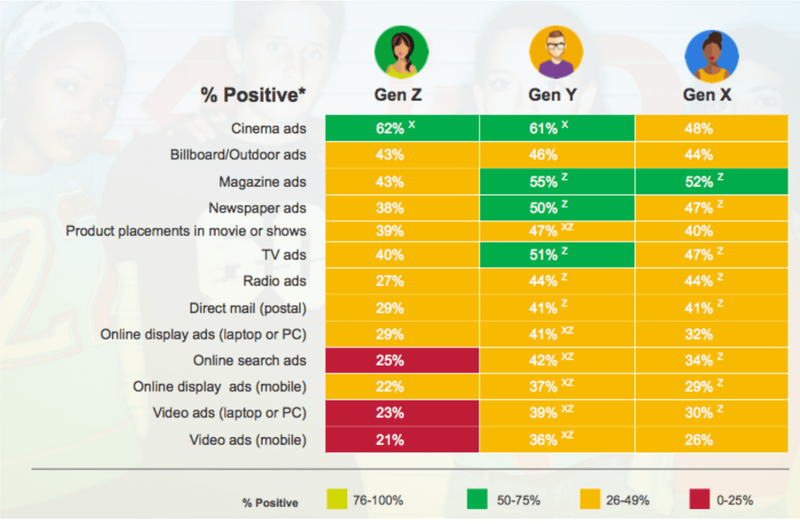It is no secret the college market is highly important for marketers. With the increased use of technology, Gen Z marketing differs greatly from more conventional forms of marketing from the 20th century. Not only do students, as a collective unit, have an enormous spending potential while in college, they are more inclined to try new things. As a result, they are more likely to experiment with different brands for all kinds of products/services, rather than making initial purchase decisions based on existing loyalties (Image 1).

Image 1: Generation Z as “Brand Experimenters”
This tendency gives less well-established brands the opportunity to pitch their values and products/services. If well received, they will gain a piece of the students’ mind-share. This is crucial real estate for brands to capture, since it is the beginning stages of the students developing brand loyalty towards the associated offering. Over time, this affinity grows stronger through repeated positive interactions, ultimately resulting in a customer segment with a rather high residual life-time value.
But the key question in this lucrative formula remains unanswered. How exactly does one market to this highly particular Gen Z audience? What strategies and channels are the most effective in converting these “brand experimenters” to “brand loyalist”?
Traditional Marketing Strategies
We are all familiar with TV ads that brands pump billions of dollars into. For example, companies in the insurance industry spent an estimated $3.9 billion to run TV ad campaigns in 2018 alone. Of course, the ads are not limited to insurance – everything from consumer products to new financial services are regulars during those timely commercial breaks. Furthermore, we have all also been subjected to ads when engaging with other forms of content both online and offline – whether it be a magazine article, direct mail, radio stations, YouTube, etc.
As a collective unit, these “traditional marketing strategies” have been quite successful over the past decades. With the advent of social media and audience targeting, we have also seen drastic improvements in conversion metrics. However, the Gen Z college market is a different beast. For starters, with the advent of online streaming platforms, many have never even had a cable television cord to cut. Furthermore, a whole 69% of Gen Z Americans block ads online using a variety of tools like Ad-blockers and simply skipping ads when they appear.
Recent research has consistently shown that what worked for previous generations doesn’t work quite as well for Gen Z (Image 2). Everything from billboard ads to online display ads are less well-received compared to their older counterparts. The largest disparity lies in online search and video ads, where the drop-off is even more drastic.

Image 2: Traditional marketing strategies positivity ratings across generations (Refuel Agency)
Experiential Marketing – Sponsored Events
The Gen Z audience presents unique challenges for marketing teams. They need to keep up with shifting preferences or risk losing out on this audience. Most notably, Gen Z consumers prefer realistic to idealistic messages. They like to be engaged by “real people.” A particular strategy that allows a brand to do just that is by employing various forms of experiential marketing.
College campuses are an ideal stomping ground for experiential initiatives. Densely populated, these hubs are full of students willing and ready to try new things. Everything from on-campus tabling activations to fun, interactive booths allows brands to create the important connection that is missing in traditional advertising.
If done properly, the results are quite favorable in eliciting the proper response. For example, 51% of college students who were personally advertised to on campus ended up researching the products advertised. 46% of students who received a sample ended up purchasing the product. 80% of people who attended a sponsored event were more confident in purchasing the featured products after viewing live demonstrations and receiving free samples (U.S Bureau of Labor). And most impressively, 98% of all attendees intend to purchase after attending an experiential marketing event.
Experiential Marketing – Brand Ambassador Programs
Sponsored events aren’t the only way to implement experiential marketing efforts on college campuses. Brand ambassador programs are also productive when it comes to building relationships with college students. According to Refuel Agency, 28% of students who talked with brand ambassadors (who are often student peers), not only researched the product, but purchased it immediately.
However, the immediate conversion metrics like sales generated is a low hanging fruit when it comes to tracking the success of such brand ambassador programs. A crucial factor that is often left out is its organic reliance the most timeless form of advertising: word-of-mouth referrals. These types of referrals accounted for almost 13% of all annual consumer sales (around $6T), with word-of-mouth impressions generating 500% more sales than paid media impressions. Most of the time, when a student hears about a brand’s product or service from a student ambassador, the sale doesn’t happen immediately. Instead, when a future need arises for the student, and the student recalls their experience with the brand of interest, that is when the conversion occurs.
Focusing on experiential marketing – in the form of sponsored events and brand ambassador programs – is statistically proven to be excellent alternative methods to capture the Gen-Z audience. Such campaigns engage the young audience and makes the messaging realistic. When marketing, it is important to understand Gen Z consumers and the lifecycle they undergo throughout their consumer journey. At Evolvez, we specialize in helping brands target this market by employing and activating brand ambassadors on college campuses all across the country.
